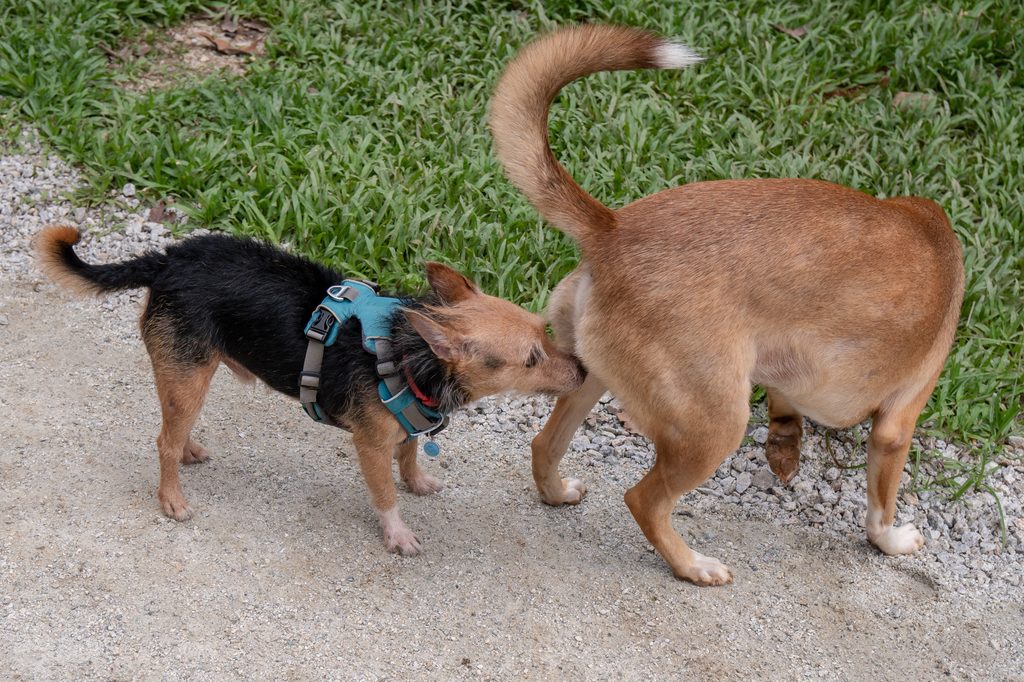Butt sniffing isn’t the most elegant and upscale of all of our dogs’ behaviors — but, let’s face it, they do a lot of things we would never be caught imitating. And while butt sniffing has long been known as a way dogs gather basic information about another pup, a new study says that sniffing another dog’s butt could be linked to cancer.

Why dog butt sniffing is bad for some dogs
According to a study from the University of Cambridge, which was recently published in the journal Veterinary Record, male dogs are more likely than female dogs to develop a particular type of venereal cancer in their oronasal region than female dogs.
It’s called Canine Transmissible Venereal Tumor (or CTVT for short), and it’s been around for 11,000 years. CTVT is unique because it’s an infectious cancer that can be spread when dogs come into contact and the living cancer cells literally “transplant” themselves from one dog to the other. This typically occurs during mating, affecting dogs’ genital areas, but it can affect areas like the nose, mouth, and skin.
Researchers reviewed almost 2,000 cases of CTVT worldwide and found only 32 affected the oronasal area. Twenty-seven of these cases belonged to male dogs. By comparison, genital cases of CTVT are split pretty evenly between the sexes.
How do researchers account for these differences? Male dogs are more likely to explore other dogs with their noses.
Dr. Andrea Strakova, in the University of Cambridge’s Department of Veterinary Medicine, first author of the paper, said in a statement:
“We found that a very significant proportion of the nose or mouth tumors of canine transmissible cancer were in male dogs… We think this is because male dogs may have a preference for sniffing or licking the female genitalia, compared to vice versa. The female genital tumors may also be more accessible for sniffing and licking, compared to the male genital tumors.”
The study notes that while mating is the most common route of CTVT transmission, it’s not the only one. Oronasal tumors could be caused by self-transmission, in which a dog “licks its own genital tumor or makes oronasal contact with its genital tumor while in a curled-up sleeping position” or “a result of non-copulatory CTVT transmission” which “could occur during activities such as licking, sniffing, scratching or parturition.”
CTVT is mostly associated in countries with a lot of free-roaming dogs, but it is a worldwide issue. Luckily, oronasal CTVT is rare, and canine transmissible cancer is treatable.
Strakova noted that while “canine transmissible cancer can be diagnosed and treated fairly easily,” veterinarians in places like the UK — where CTVT is relatively rare but on the rise — might not be familiar with the symptoms.
“We think it’s important to consider CTVT as a possible diagnosis for oronasal tumors in dogs,” she added. “Treatment is very effective… and the vast majority of dogs recover.”
Symptoms of oronasal CTVT include:
- Sneezing
- Snoring
- Difficulty breathing
- Nasal deformation
- Bloody and other discharge from the nose or mouth
While CTVT is absent from most regions in the U.S., it has been reported in dogs living in remote indigenous communities, such as in Arizona and North Dakota.
So while you don’t have to stress out too much about your dog getting cancer from one of their new playmates, you might want to vet any new dogs you meet when you travel with your dog before they engage in that age-old butt-sniffing tradition.


